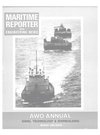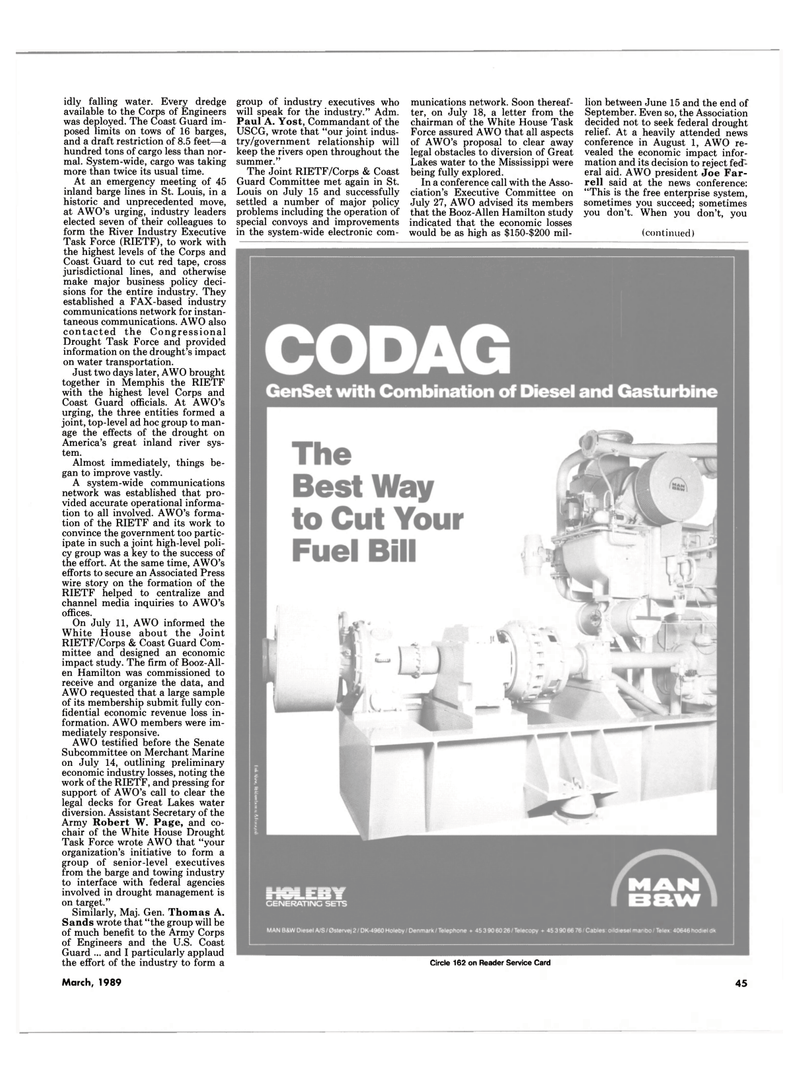
Page 45: of Maritime Reporter Magazine (March 1989)
Read this page in Pdf, Flash or Html5 edition of March 1989 Maritime Reporter Magazine
idly falling water. Every dredge available to the Corps of Engineers was deployed. The Coast Guard im- posed limits on tows of 16 barges, and a draft restriction of 8.5 feet-—a hundred tons of cargo less than nor- mal. System-wide, cargo was taking more than twice its usual time.
At an emergency meeting of 45 inland barge lines in St. Louis, in a historic and unprecedented move, at AWO's urging, industry leaders elected seven of their colleagues to form the River Industry Executive
Task Force (RIETF), to work with the highest levels of the Corps and
Coast Guard to cut red tape, cross jurisdictional lines, and otherwise make major business policy deci- sions for the entire industry. They established a FAX-based industry communications network for instan- taneous communications. AWO also contacted the Congressional
Drought Task Force and provided information on the drought's impact on water transportation.
Just two days later, AWO brought together in Memphis the RIETF with the highest level Corps and
Coast Guard officials. At AWO's urging, the three entities formed a joint, top-level ad hoc group to man- age the effects of the drought on
America's great inland river sys- tem.
Almost immediately, things be- gan to improve vastly.
A system-wide communications network was established that pro- vided accurate operational informa- tion to all involved. AWO's forma- tion of the RIETF and its work to convince the government too partic- ipate in such a joint high-level poli- cy group was a key to the success of the effort. At the same time, AWO's efforts to secure an Associated Press wire story on the formation of the
RIETF helped to centralize and channel media inquiries to AWO's offices.
On July 11, AWO informed the
White House about the Joint
RIETF/Corps & Coast Guard Com- mittee and designed an economic impact study. The firm of Booz-All- en Hamilton was commissioned to receive and organize the data, and
AWO requested that a large sample of its membership submit fully con- fidential economic revenue loss in- formation. AWO members were im- mediately responsive.
AWO testified before the Senate
Subcommittee on Merchant Marine on July 14, outlining preliminary economic industry losses, noting the work of the RIETF, and pressing for support of AWO's call to clear the legal decks for Great Lakes water diversion. Assistant Secretary of the
Army Robert W. Page, and co- chair of the White House Drought
Task Force wrote AWO that "your organization's initiative to form a group of senior-level executives from the barge and towing industry to interface with federal agencies involved in drought management is on target."
Similarly, Maj. Gen. Thomas A.
Sands wrote that "the group will be of much benefit to the Army Corps of Engineers and the U.S. Coast
Guard ... and I particularly applaud the effort of the industry to form a group of industry executives who will speak for the industry." Adm.
Paul A. Yost, Commandant of the
USCG, wrote that "our joint indus- try/government relationship will keep the rivers open throughout the summer."
The Joint RIETF/Corps & Coast
Guard Committee met again in St.
Louis on July 15 and successfully settled a number of major policy problems including the operation of special convoys and improvements in the system-wide electronic com- munications network. Soon thereaf- ter, on July 18, a letter from the chairman of the White House Task
Force assured AWO that all aspects of AWO's proposal to clear away legal obstacles to diversion of Great
Lakes water to the Mississippi were being fully explored.
In a conference call with the Asso- ciation's Executive Committee on
July 27, AWO advised its members that the Booz-Allen Hamilton study indicated that the economic losses would be as high as $150-$200 mil- lion between June 15 and the end of
September. Even so, the Association decided not to seek federal drought relief. At a heavily attended news conference in August 1, AWO re- vealed the economic impact infor- mation and its decision to reject fecT- eral aid. AWO president Joe Far- rell said at the news conference: "This is the free enterprise system, sometimes you succeed; sometimes you don't. When you don't, you (continued)
Circle 162 on Reader Service Card
March, 1989 45 1

 44
44

 46
46
